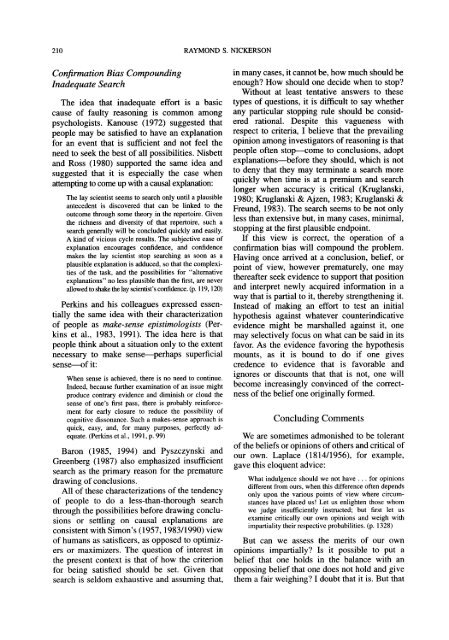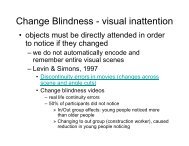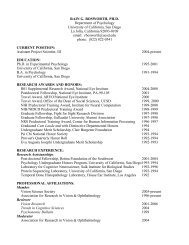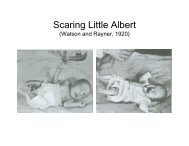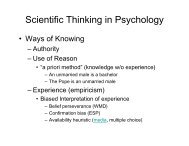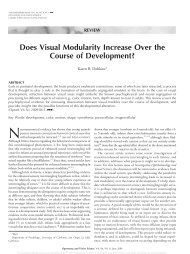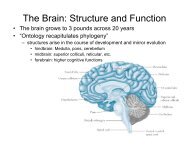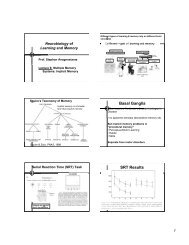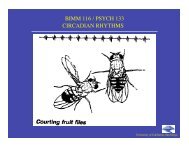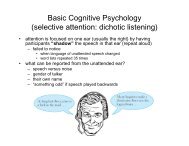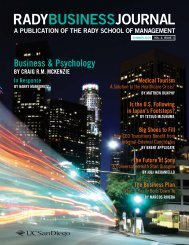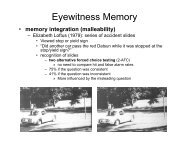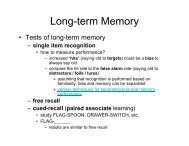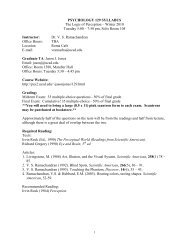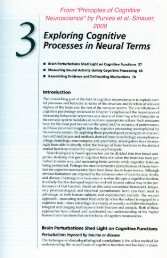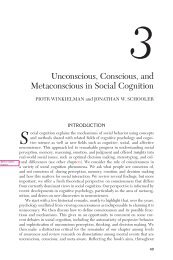Confirmation Bias: A Ubiquitous Phenomenon in Many Guises
Confirmation Bias: A Ubiquitous Phenomenon in Many Guises
Confirmation Bias: A Ubiquitous Phenomenon in Many Guises
You also want an ePaper? Increase the reach of your titles
YUMPU automatically turns print PDFs into web optimized ePapers that Google loves.
210 RAYMOND S. NICKERSON<br />
<strong>Confirmation</strong> <strong>Bias</strong> Compound<strong>in</strong>g<br />
Inadequate Search<br />
The idea that <strong>in</strong>adequate effort is a basic<br />
cause of faulty reason<strong>in</strong>g is common among<br />
psychologists. Kanouse (1972) suggested that<br />
people may be satisfied to have an explanation<br />
for an event that is sufficient and not feel the<br />
need to seek the best of all possibilities. Nisbett<br />
and Ross (1980) supported the same idea and<br />
suggested that it is especially the case when<br />
attempt<strong>in</strong>g to come up with a causal explanation:<br />
The lay scientist seems to search only until a plausible<br />
antecedent is discovered that can be l<strong>in</strong>ked to the<br />
outcome through some theory <strong>in</strong> the repertoire. Given<br />
the richness and diversity of that repertoire, such a<br />
search generally will be concluded quickly and easily.<br />
A k<strong>in</strong>d of vicious cycle results. The subjective ease of<br />
explanation encourages confidence, and confidence<br />
makes the lay scientist stop search<strong>in</strong>g as soon as a<br />
plausible explanation is adduced, so that the complexities<br />
of the task, and the possibilities for "alternative<br />
explanations" no less plausible than the first, are never<br />
allowed to shake the lay scientist's confidence, (p. 119,120)<br />
Perk<strong>in</strong>s and his colleagues expressed essentially<br />
the same idea with their characterization<br />
of people as make-sense epistimologists (Perk<strong>in</strong>s<br />
et al., 1983, 1991). The idea here is that<br />
people th<strong>in</strong>k about a situation only to the extent<br />
necessary to make sense—perhaps superficial<br />
sense—of it:<br />
When sense is achieved, there is no need to cont<strong>in</strong>ue.<br />
Indeed, because further exam<strong>in</strong>ation of an issue might<br />
produce contrary evidence and dim<strong>in</strong>ish or cloud the<br />
sense of one's first pass, there is probably re<strong>in</strong>forcement<br />
for early closure to reduce the possibility of<br />
cognitive dissonance. Such a makes-sense approach is<br />
quick, easy, and, for many purposes, perfectly adequate.<br />
(Perk<strong>in</strong>s et al., 1991, p. 99)<br />
Baron (1985, 1994) and Pyszczynski and<br />
Greenberg (1987) also emphasized <strong>in</strong>sufficient<br />
search as the primary reason for the premature<br />
draw<strong>in</strong>g of conclusions.<br />
All of these characterizations of the tendency<br />
of people to do a less-than-thorough search<br />
through the possibilities before draw<strong>in</strong>g conclusions<br />
or settl<strong>in</strong>g on causal explanations are<br />
consistent with Simon's (1957,1983/1990) view<br />
of humans as satisficers, as opposed to optimizers<br />
or maximizers. The question of <strong>in</strong>terest <strong>in</strong><br />
the present context is that of how the criterion<br />
for be<strong>in</strong>g satisfied should be set. Given that<br />
search is seldom exhaustive and assum<strong>in</strong>g that,<br />
<strong>in</strong> many cases, it cannot be, how much should be<br />
enough? How should one decide when to stop?<br />
Without at least tentative answers to these<br />
types of questions, it is difficult to say whether<br />
any particular stopp<strong>in</strong>g rule should be considered<br />
rational. Despite this vagueness with<br />
respect to criteria, I believe that the prevail<strong>in</strong>g<br />
op<strong>in</strong>ion among <strong>in</strong>vestigators of reason<strong>in</strong>g is that<br />
people often stop—come to conclusions, adopt<br />
explanations—before they should, which is not<br />
to deny that they may term<strong>in</strong>ate a search more<br />
quickly when time is at a premium and search<br />
longer when accuracy is critical (Kruglanski,<br />
1980; Kruglanski & Ajzen, 1983; Kruglanski &<br />
Freund, 1983). The search seems to be not only<br />
less than extensive but, <strong>in</strong> many cases, m<strong>in</strong>imal,<br />
stopp<strong>in</strong>g at the first plausible endpo<strong>in</strong>t.<br />
If this view is correct, the operation of a<br />
confirmation bias will compound the problem.<br />
Hav<strong>in</strong>g once arrived at a conclusion, belief, or<br />
po<strong>in</strong>t of view, however prematurely, one may<br />
thereafter seek evidence to support that position<br />
and <strong>in</strong>terpret newly acquired <strong>in</strong>formation <strong>in</strong> a<br />
way that is partial to it, thereby strengthen<strong>in</strong>g it.<br />
Instead of mak<strong>in</strong>g an effort to test an <strong>in</strong>itial<br />
hypothesis aga<strong>in</strong>st whatever counter<strong>in</strong>dicative<br />
evidence might be marshalled aga<strong>in</strong>st it, one<br />
may selectively focus on what can be said <strong>in</strong> its<br />
favor. As the evidence favor<strong>in</strong>g the hypothesis<br />
mounts, as it is bound to do if one gives<br />
credence to evidence that is favorable and<br />
ignores or discounts that that is not, one will<br />
become <strong>in</strong>creas<strong>in</strong>gly conv<strong>in</strong>ced of the correctness<br />
of the belief one orig<strong>in</strong>ally formed.<br />
Conclud<strong>in</strong>g Comments<br />
We are sometimes admonished to be tolerant<br />
of the beliefs or op<strong>in</strong>ions of others and critical of<br />
our own. Laplace (1814/1956), for example,<br />
gave this eloquent advice:<br />
What <strong>in</strong>dulgence should we not have . . . for op<strong>in</strong>ions<br />
different from ours, when this difference often depends<br />
only upon the various po<strong>in</strong>ts of view where circumstances<br />
have placed us! Let us enlighten those whom<br />
we judge <strong>in</strong>sufficiently <strong>in</strong>structed; but first let us<br />
exam<strong>in</strong>e critically our own op<strong>in</strong>ions and weigh with<br />
impartiality their respective probabilities, (p. 1328)<br />
But can we assess the merits of our own<br />
op<strong>in</strong>ions impartially? Is it possible to put a<br />
belief that one holds <strong>in</strong> the balance with an<br />
oppos<strong>in</strong>g belief that one does not hold and give<br />
them a fair weigh<strong>in</strong>g? I doubt that it is. But that


